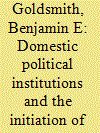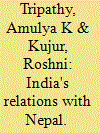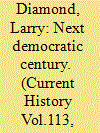|
|
|
Sort Order |
|
|
|
Items / Page
|
|
|
|
|
|
|
| Srl | Item |
| 1 |
ID:
128859


|
|
|
|
|
| Publication |
2014.
|
| Summary/Abstract |
Does women's empowerment strengthen global good citizenship? We test theories of democratic foreign policy and feminist international relations that suggest that more deeply democratic countries with greater gender equity will be stronger international human rights promoters. First, the direct empowerment of women as policymakers and civil society constituencies may shift states' incentives and ability to pursue international human rights initiatives. Second, greater sexual equality may lead to feminist socialization of the wider society to promote human rights values. We test these predictions by measuring the relationship between five different measures of sexual equality and a country's propensity to support 30 international human rights outcomes, including legal commitments, humanitarian assistance, and sanctions, controlling for previously established contributing factors such as level of development and democratic regime type. We find that more sexually equal countries are more likely to support international commitments to constrain state violence against individuals, international measures to combat gender and sexual orientation discrimination, and more and higher quality development assistance. However, sexual equality appears to yield less benefit for more costly human rights initiatives: yielding sovereignty to international legal institutions, promoting economic rights through concessionary trade policies, or adopting diplomatic sanctions against pariah states. These effects are stronger in democratic states, where citizen empowerment translates more readily into foreign policy, and are also found in a sample that excludes the Western powers.
|
|
|
|
|
|
|
|
|
|
|
|
|
|
|
|
| 2 |
ID:
131387


|
|
|
|
|
| Publication |
2014.
|
| Summary/Abstract |
There is doubt about whether the 'democratic peace' proposition applies in Asia. I theoretically deconstruct regime type into institutional components including political competition, constraint on the executive, and mass participation, and ask whether taking these as distinct causal factors gives more empirical purchase on the relationship of domestic political institutions to states' external conflict behavior. I find that higher levels of political competition are associated with a lower likelihood of conflict initiation, but only when the potential target is relatively democratic. Thus, my directed-dyad analysis is consistent with a democratic peace effect in East Asia. It is also suggestive regarding the observed 'East Asian peace' that has existed since 1979, because levels of political competition have risen considerably in the region, beginning in the late 1970s.
|
|
|
|
|
|
|
|
|
|
|
|
|
|
|
|
| 3 |
ID:
133911


|
|
|
|
|
| Publication |
2014.
|
| Summary/Abstract |
It can be safely concluded that external powers have more to do in Nepali domestic politics, than Nepalis themselves do. It is unlikely that Nepal would have a smooth sail in the near future. With the intensifying contentions, both overt and covert, between and among China, the US and India, Nepal's politics can hardly be expected to have a democratic regime in the years to come. The things will become stable once the present cat-and-dog contention in the Himalayan Asia reaches saturation and a conclusive end. Timeframe and modus operandi for that cannot be predicted, for various variables could differ the state of affairs. It is US and China's interest to control the region.
|
|
|
|
|
|
|
|
|
|
|
|
|
|
|
|
| 4 |
ID:
127562


|
|
|
|
|
| Publication |
2014.
|
| Summary/Abstract |
This is an odd moment to predict a bright future for democracy. Despite the unprecedented expansion of political freedom during the three decades from 1974, democratic regimes are in trouble worldwide today. The past decade has witnessed democratic breakdowns at a growing pace, and levels of freedom have receded in many places. Autocrats are cooperating and innovating to preempt movements for democratic change. The world's oldest and most esteemed democracies, beginning with the United States, have lost their luster and (it seems) their capacity to function effectively to address their most important public policy challenges. Still, no other broadly legitimate form of government exists today, and authoritarian regimes face profound challenges and contradictions that they cannot resolve without ultimately moving toward democracy.
|
|
|
|
|
|
|
|
|
|
|
|
|
|
|
|
|
|
|
|
|